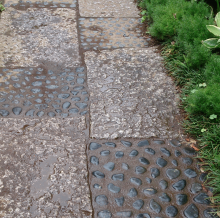Uchimizu
Even at the height of summer, when the heat of the afternoon is tempered, it is more comfortable being exposed to a light breeze than staying at home. Accordingly, the custom of “yu-suzumi (夕涼み, enjoying the cool evening breeze)” was formed. Playing shogi (Japanese chess) on the endai (wooden bar-type bench) placed in front of the house, or enjoying fireworks in a yukata (summer cotton kimono) was a feature of summer in Japan.
“Uchimizu” is essential for enjoying the cool evening breeze. The word “utsu (打)”originally means “hit” in English, but also means “sprinkle.” In literal terms “Uchimizu (打ち水)”means an action to sprinkle water (水). We can feel refreshing air when we sprinkle water by dipper or hand from a tub or a bucket.
It is said that uchimizu is originated in the manner of sado (tea ceremony). In the Edo Era, uchimizu was useful for laying the dust stirred up from unpaved roads, and it was pervasive in everyday life of the people in Edo. As time went by, roads were paved and air-conditioners became popular, and customs such as “uchimizu” or “yusuzumi” diminished.
But recently, the effects of uchimizu are being revaluated as the heat-island phenomenon due to urbanization and energy problems becomes an emerging issue. Promotional events entitled “Mission Uchimizu” have been held throughout Japan since 2003.
It is scientifically proven that by sprinkling water, vaporization decreases the ground surface temperature by 1℃ - 2℃. But, the sprinkling of water under the burning sun produces an adverse effect. The humidity level becomes higher and the perceived temperature is also increasing. It is appropriate to sprinkle water in the early morning or in the evening. However, using tap water is not recommended. Therefore, in “Mission Uchimizu”using rainwater in buckets or bathwater left in bath tubs is recommended from an eco-friendly perspective.
Are the effects of uchimizu measured only by factual evidence? If we focus on the efficiency, the use of high-pressure sprinklers or hoses is more reasonable. Also, people living in high-rise buildings obtain fewer benefits from uchimizu.
Uchimizu is more connected with the Japanese mentality than with the substantial effectiveness. For example, we feel very refreshed when we see water being gracefully sprinkled on the stone pavements in front of a traditional shop.
Like a river breeze or sea breeze, the refereshing air we feel due to the water gives us comfort or serenity in a different way from artificial things. For Japanese, “water” is a symbol of natural blessings, and a holy thing that purifies. Sprinkling water also means appreciating water through touching and feeling it.
How about having time with your neighbors on an off-street where water is sprinkled and enjoying the cool evening breeze together?
We can re-evaluate such time as an old and new way to spend an evening on a summer day.
(Kenji Suzuki)











